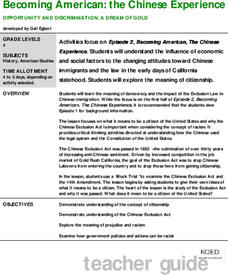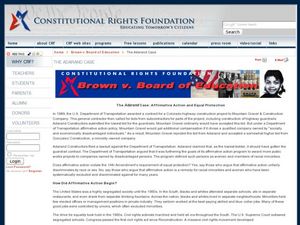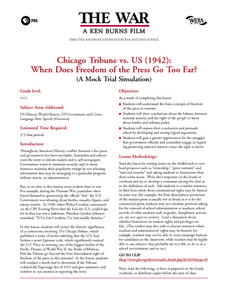Mrs. Hodges' Social Studies Classes
I Have Rights?!
Do young people have rights in the United States? Your pupils will not only learn the answer to this important question, but will also build vocabulary through cloze activities and gain a thorough introduction to the Bill of Rights.
Curated OER
Should Homosexuals Have the Right to Laws Protecting Them From Discrimination?
Students explore discrimination issues in America. For this homosexual rights lesson, students listen to their instructor lecture on antidiscrimination laws and gay rights. Students respond to questions about the Romer v. Evans case.
Curated OER
How was the Constitution Used to Organize the New Government?
How did the United States Congress determine how the new president and vice president would be named when the nation was first established? Who would provide money for the government, and how would the executive branch be organized?
Curated OER
Suffrage and Civil Rights
Addressing the main ideas of the Civil Rights movement, this learning exercise contains both multiple choice and true/false questions for student review. Teachers could use this activity as a quiz or homework assignment.
Curated OER
History Quiz 4
In this history instructional activity, high schoolers complete short answer questions about different World Wars, Prime Ministers, cities in different countries, and more. Students complete 20 questions.
Curated OER
Arrest- A Legal System Simulation
What would your class do if a police officer arrested a student in class? This is exactly the anticipatory set that gets students engaged in a unit on the legal system. The plan is to get the officer to simulate an arrest, and then guest...
Curated OER
Opportunity and Discrimination, A Dream of Gold
Young scholars focus on what it means to be a citizen of the United States and why the Chinese Exclusion Act is important when considering the concept of racism.
Curated OER
Arrest
Students become active participants in the legal process as they take on the roles of witnesses, jurors, and defendants in a trial simulation. An understanding and appreciation of the legal system is fostered through the experience.
Curated OER
The Adarand Case: Affirmative Action and Equal Protection
Eleventh graders examine the Adarand case. In this American Government lesson, 11th graders create a list of reasons for each affirmative action program. Students develop a defense on certain issues and present it to the...
Curated OER
Reparations for Slavery
Young scholars analyze slavery reparations. In this American history instructional activity, students examine the pros and cons of paying reparations for slavery and participate in a discussion.
Curated OER
Don't Let Your Rights Be Violated
Ninth graders engage in a study of the First Amendment of The Constitution. They read the amendment and use a highlighter to note the important parts. Then students journal the connections of its importance to daily life. They include...
Curated OER
Democracy, A Basic Element In Our Society
Learners investigate the concept of freedom with the context of the First Amendment. They research and take notes looking for the connections between democracy and freedom. They complete a writing assessment that includes naming all of...
Curated OER
Will the Supreme Court Vouch for Vouchers?
Students investigate past Supreme Court decisions that have centered on education issues and assess the ways in which those decisions have impacted American education. They consider the controversies surrounding the issue of school...
Curated OER
Cartoons for the Classroom: Bushwhacked
In this historical events worksheet, students analyze political cartoons that feature caricatures of President George W. Bush. Students respond to 3 short answer questions.
Curated OER
The Liberty Bell: From Obscurity to Icon
Students analyze the historical and cultural influences that shaped the symbolic meaning of the Liberty Bell, located in Phila., PA, evaluate the accuracy of historical sources, and research the way patriotic symbols are used in their...
Curated OER
Freedom of the Press Around the World
Students research press freedoms in various countries such as Iran and North Korea. They create a freedom of the press report card for the countries examined.
Curated OER
Cartoons for the Classroom: Why Are Cartoonists Vital to Democracy?
For this current events worksheet, students analyze a political cartoon about the role of political cartoonists in democracies and respond to 3 talking point questions.
Curated OER
Media Arts Production
Students learn about the basic legal and ethical responsibilities shouldered by people making "reality" videos (i.e. videos with non-actors).
Curated OER
Marching For Freedom
Students appreciate the sacrifices that people from across the country made to ensure that all citizens could exercise their constitutional right to vote. They access excellent websites and documents imbedded in this plan to guide their...
Curated OER
The Many Faces of Paul Robeson
Students discuss and construct timelines based on the life of author/performer/Civil Right's activist, Paul Robeson. They view photographs of him at various times in his life and discuss the roles he may have been playing at those times.
Curated OER
Patriotism and Foreign Policy
Twelfth graders create a museum of Patriotism and Foreign Policy. They participate in discussions and work in committee's to determine which objects shall be displayed in the museum. They present visual and performing arts along with...
Curated OER
Swift Response
Young scholars examine how matters of national security affect the press' ability to practice free speech. They read and discuss an article regarding the Swift program, discuss opinions about patriotism and the press, and write a letter...
Curated OER
Chicago Tribune vs. US (1942): When Does Freedom of the Press Go Too Far?
High schoolers define freedom of the press in peace and war time. As a class, they identify the need for the public to be informed, but discuss where the line should be drawn to protect national security. They develop their arguments...
Curated OER
The Down Low Talk Show
Students examine popular fashion trends and their personal tastes in clothing styles. They explore the legislation and controversy over wearing pants too low by reading and discussing the article "Are Your Jeans Sagging? Go Directly to...

























